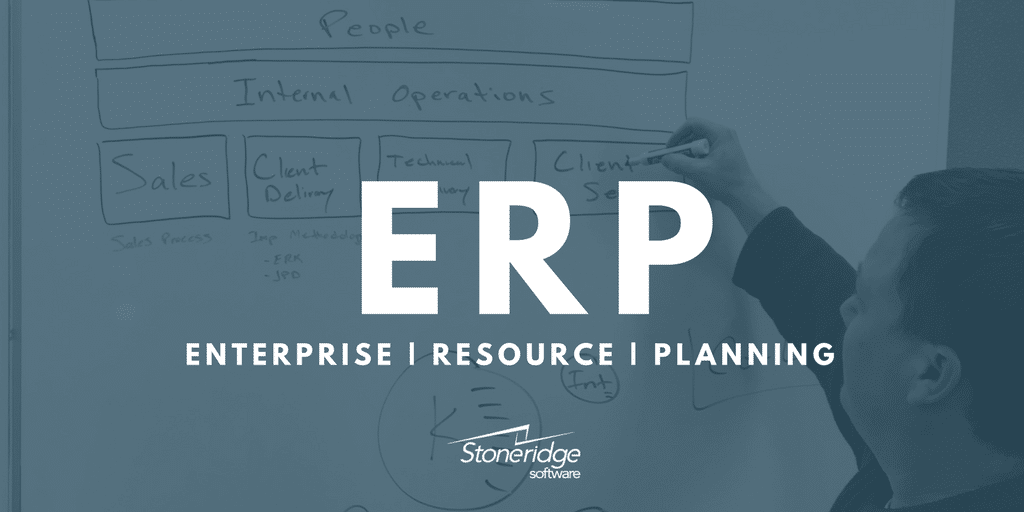Why the Heck Should You Invest in ERP?
I joined Stoneridge Software in November and like all good new employees, I started asking a lot of questions. The headline above obviously tells you that one of my questions was to better understand why our clients invest in ERP. I was not asking why they hire Stoneridge Software, but instead, why do they invest in ERP in the first place? To get started, I first had to define the terms.
Wikipedia definition: Enterprise resource planning (ERP) is the integrated management of core business processes, often in real-time and mediated by software and technology. ERP is usually referred to as a category of business-management software — typically a suite of integrated applications—that an organization can use to collect, store, manage and interpret data from these many business activities.
This definition shows that ERP is both a verb (process, manage) and a noun (integrated software applications). Today, I hear it used mostly as a noun (ERP software application), which provides end-to-end information and process management solutions for an organization.
It has become normal to think of ERP as a software application. It is not wrong, but just remember that it is only one piece of the people, process, and systems puzzle. However, I tend to believe that originally, this acronym was created as a verb and to understand this line of thinking, we need to define each of the individual words.
Defining Enterprise Resource Planning
Enterprise – a business organization.
I believe that the key reason that this word was originally included is that it distinguishes between the individual and the entire organization holistically. Bottom line, ERP is about the organization, not any one person.
Resource – something that is available for use.
Company executives focus on getting the most out of their available resources and to the extent that they are successful, they drive the value of the company. These resources can include people, assets, tools, and intangibles. Bottom line, ERP is about getting the most out of the available resources.
Planning – an orderly or step-by-step conception or proposal for accomplishing an objective.
Planning is about intentions, objectives and the future and it helps us get from where we are to where we want to be. Bottom line, ERP is thoughtful and intentional planning.
Put it all together, and ERP (the verb) is planning that maximizes the value of resources across the entire enterprise. So let’s look at how this concept plays out in the real world?
Your enterprise
The first step is defining your organization. Who are you and why do you exist? What are your goals? Who are the leaders that will take you from point A to point B? What do the individual team members need to do their jobs successfully? Your organization will only function at peak productivity through understanding and collaboration of all resources and the availability and accessibility of vital information.
Lastly, it is important to know the competitive environment in which your organization competes. It is important to understand how you compare to other companies so that you can keep up and exploit opportunities to win.
Your resources
A resource can be tangible or intangible. Depending on the type of company, your most important resources may be your professionals, service workers, products, brand, production capabilities, distribution, transaction capabilities and more. Understanding which resources are most important to your company and how they help you compete is critical to long-term success.
Here are just a few examples of the not-so-obvious vital company resources I have seen during my time at Stoneridge:
• Distributor Sales Force – collaborating and communicating through technology to enable sales effectiveness
• Mass Customization – managing end-to-end processes related to loyalty/recognition programs
• Professional Services – directing millions of hours of consulting work and identifying opportunities to cut unproductive time
• Sensors/Monitors – monitoring machine or facility conditions to optimize results and maintain regulatory compliance
• Order Processing – improving the customer experience through e-commerce systems that build your reputation as fast and/or easy to work with
Your planners/leaders
CXO level managers from across the major disciplines in a company seek higher rates of return on available resources across the enterprise or within their individual groups. Collaboration applications include ERP software, but also SharePoint, CRM, Teams, Planner, and others that allow the leaders to manage their plans and their teams to execute their priorities, in the same way, every time creating efficiencies and therefore value.
So, why should your time and money be invested in ERP?
Enterprise Resource Planning, executed by company leaders, and facilitated by the work of individual team members, is a planning process intended to get the most out of all available resources across the entire enterprise. Planning is all about knowing where you are (in terms of people, process, and systems), where you want to be, and how you expect to get there. If you’re a leader that does this well and you have the right tools to do so, you make your enterprise more productive and therefore drive value and profits. And that is why companies invest in ERP.
If you'd like to continue the ERP conversation, let me know. I'd love to hear from you.
[button title="Talk to Us about ERP" link="/contact-us/" new_tab="yes"]
Under the terms of this license, you are authorized to share and redistribute the content across various mediums, subject to adherence to the specified conditions: you must provide proper attribution to Stoneridge as the original creator in a manner that does not imply their endorsement of your use, the material is to be utilized solely for non-commercial purposes, and alterations, modifications, or derivative works based on the original material are strictly prohibited.
Responsibility rests with the licensee to ensure that their use of the material does not violate any other rights.

